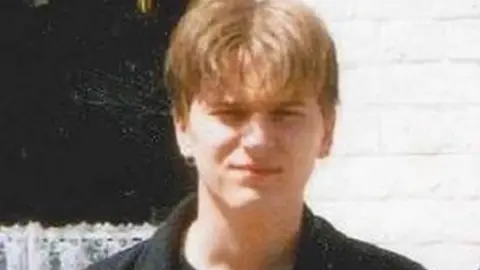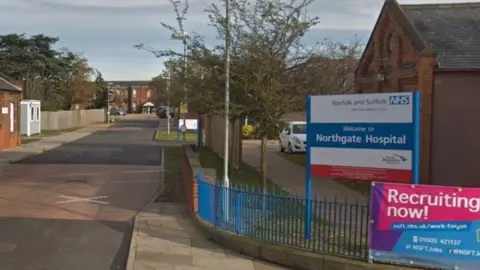Norfolk coroner's warning about lack of changes since Northgate Hospital death
 Harris family
Harris familyA coroner has raised concerns about a mental heath trust where staff falsified records made on the night a man died.
Eliot Harris, 48, died in the Northgate Hospital in Great Yarmouth, run by the Norfolk and Suffolk Foundation Trust (NSFT), in April 2020.
Norfolk coroner Jacqueline Lake said that, two years on, staff were still not recording observations properly.
NSFT said "significant changes were made" following Mr Harris's death.
The 48-year-old, who had schizophrenia, had been sectioned under the Mental Health Act after he became agitated at his care home and refused to take medication.
He was taken to Northgate Hospital and, after a period in a seclusion room, was transferred to a private room on the ward.
Mr Harris was discovered unresponsive in bed during the early hours of 10 April and pronounced dead half an hour later.
In April an inquest jury found the practices at Northgate Hospital in Great Yarmouth were "encouraged" by managers, but could not determine a conclusive cause of death.
'Muck in'
In a Prevention of Future Deaths Report (PFDR), Ms Lake said: "Quality audits undertaken following Eliot Harris's death, show that observations are still not being carried out and recorded in accordance with NSFT's most recent policy - more than two years following Eliot's death."
She said that on the night Mr Harris died there was no nurse in charge and instead of being allocated specific tasks, staff were told to "muck in", causing confusion about job responsibilities.
These issues were not resolved at the time of the inquest, she said, with no evidence provided about whether specific tasks were allocated on the night shift.
 Google
GoogleNot all staff had been trained in recording observations, there was a lack of evidence about procedures for entering a patient's room over concerns for their welfare, and there was "still some way to go to make sure care plans are completed", Ms Lake said.
The inquest had heard that staff were reluctant to enter Mr Harris' room following concern for his wellbeing.
Stuart Richardson, chief executive of NSFT, apologised for the "distress that his [Eliot's] tragic loss has caused".
"The Trust conducted an extensive internal investigation and after reviewing the report following Eliot's death, significant changes were made," he said.
"We have strengthened workforce training and care planning to improve the way we engage with patients. We have introduced new processes to make sure therapeutic observations are completed in a timely and consistent way. We have introduced mandatory safety workshops on the ward which all staff must attend.
"The trust is working hard to strengthen our processes and make improvements across the organisation to make sure we can better support the patients we serve."

Find BBC News: East of England on Facebook, Instagram and Twitter. If you have a story suggestion email [email protected]
